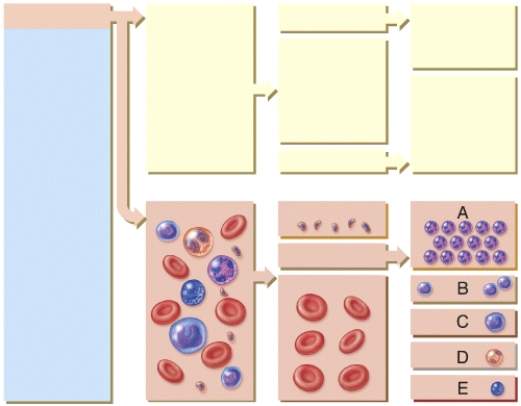Exam 18: The Cardiovascular System: the Blood
Exam 1: An Introduction to the Human Body102 Questions
Exam 2: The Chemical Level of Organization79 Questions
Exam 3: The Cellular Level of Organization111 Questions
Exam 4: The Tissue Level of Organization106 Questions
Exam 5: The Integumentary System67 Questions
Exam 6: Introduction to the Skeletal System82 Questions
Exam 7: The Axial Skeleton106 Questions
Exam 8: The Appendicular Skeleton117 Questions
Exam 9: Articulations78 Questions
Exam 10: Muscle Tissue93 Questions
Exam 11: The Muscular System82 Questions
Exam 12: Introduction to the Nervous System86 Questions
Exam 13: The Central Nervous System63 Questions
Exam 14: The Peripheral Nervous System65 Questions
Exam 15: Sensory, Motor, and Integrative Systems50 Questions
Exam 16: The Special Senses55 Questions
Exam 17: The Endocrine System45 Questions
Exam 18: The Cardiovascular System: the Blood40 Questions
Exam 19: The Cardiovascular System: the Heart51 Questions
Exam 20: The Cardiovascular System: Blood Vessels45 Questions
Exam 21: The Lymphatic System and Immunity51 Questions
Exam 22: The Respiratory System56 Questions
Exam 23: The Digestive System75 Questions
Exam 24: The Urinary System69 Questions
Exam 25: The Reproductive Systems and Development69 Questions
Select questions type
List the three stages of blood clotting in sequential order of activation.
(Essay)
4.8/5  (29)
(29)
The process by which formed elements of the blood develop is called ___.
(Multiple Choice)
4.7/5  (35)
(35)
What antigens does a person have on their RBC if their plasma has antibody A?
(Multiple Choice)
4.9/5  (40)
(40)
Which of the following plasma proteins plays a role in disease resistance?
(Multiple Choice)
4.9/5  (35)
(35)
Considering Rh blood types, which of the following situations could result in maternal antibodies attacking the fetus?
(Multiple Choice)
5.0/5  (29)
(29)
Which of the following cells will increase the number of nuclear lobes as they age? 
(Multiple Choice)
4.8/5  (33)
(33)
What antibodies does a person with type O blood have in their plasma?
(Multiple Choice)
4.8/5  (42)
(42)
Once ___ is formed, the intrinsic and extrinsic pathways are identical.
(Multiple Choice)
4.8/5  (27)
(27)
Showing 21 - 40 of 40
Filters
- Essay(0)
- Multiple Choice(0)
- Short Answer(0)
- True False(0)
- Matching(0)